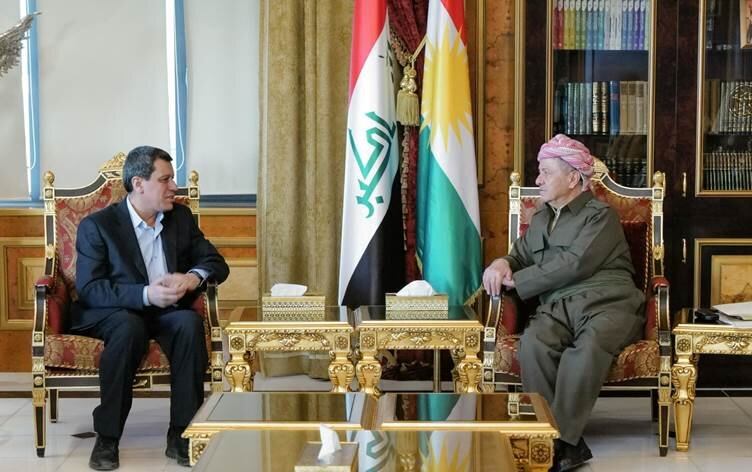What does Trump seek by reassuring SDF?

BEIRUT- Following the meeting of Mazloum Abdi, the commander-in-chief of the Syrian Democratic Forces (SDF), with Masoud Barzani, the leader of the Iraqi Kurdistan region, it seems that Syria’s Kurdish crisis will witness remarkable developments.
The Abdi-Barzani meeting focused on the need to support the US efforts to stop Turkish attacks on the SDF through mediation from the Iraqi Kurdistan in exchange for guarantees Kurdistan Workers’ Party (PKK) rebels would leave.
The possibility of the Peshmerga Rojava forces entering the SDF areas to protect them was also discussed while emphasizing the importance of Kurdish reconciliation in forming a unified Kurdish reference that includes all parties active in northeastern Syria.
During the Abdi-Barzani meeting, it was agreed to send a unified Kurdish delegation to Damascus to meet with the new Syrian rulers.
The meeting coincided with the US President-elect, Donald Trump’s confirmation of his continued support for the Kurds, following the visit of Michael Kurilla, the commander of the US Central Command (CENTCOM), to the US occupation bases in Syria, where he met with SDF officials to discuss the prospects of the war on ISIS in Syria and “efforts to prevent the emergence of any terrorist groups.”
During a hearing before the Foreign Relations Committee in the US Senate, Marco Rubio, the candidate for Secretary of State, also reiterated Trump’s support for SDF.
Rubio has noted that Trump’s administration will ask Turkey not to carry out any hostile actions against the Kurds in Syria, claiming that one of the reasons for Washington’s ability to dismantle ISIS is that the Kurds “guard the organization’s prisons.”
Rubio has further claimed that their main goal is to prevent Syria from being a “haven for ISIS”, stressing the need to ensure that Syrian territory is not used by Iran “to spread its agenda.”
The SDF commander-in-chief visited Erbil days after Hamid al-Darbandi, Barzani’s envoy, met with representatives of the Autonomous Administration and the Kurdish National Council in Syria under the pretext of pushing forward with unifying the Kurdish ranks.
In a post on X, Abdi claimed that the position of the two sides - the SDF and the Kurdistan Region of Iraq - is identical, and aims to proceed with a “peaceful dialogue with Damascus to guarantee the rights of the Kurdish people.”
During Michael Kurilla’s visit to the Al-Hawl camp for displaced persons, Kurilla called for intensifying international efforts to return ISIS families to their countries for rehabilitation and integration.
The US reassurance confirms Washington’s objection to the Turkish policy of exploiting the fall of the Assad government to eliminate Kurdish organizations in both Syria and Turkey.
What portends a worsening of the US-Turkish dispute over the SDF is the escalation of Turkish airstrikes on Ayn al-Arab (Kobani), the countryside of Manbij, Sarrin, the vicinity of Tishrin Dam, and even the Syrian city of Qamishli.
Ankara’s escalation of pressure on the new US administration to abandon the SDF coincided with dispelling Washington’s concerns about cooperating with the new Syrian administration to control ISIS prisons and camps; Washington believes this is important to ensure that ISIS does not exploit any security vacuum.
Reportedly, following the opening of the headquarters of the Syrian Democratic Council in Damascus, coordination continues between the SDF and the al-Julani government regarding the situation in the northeastern regions of Syria.
According to Ahmed al-Dalati, a leader in the al-Julani government, “the new administration prefers to reach peaceful settlements to resolve the differences with the SDF,” stressing that “the military solution will be the last option on the table.”
It is worth noting that Siyamand Ali, director of the media center of the Kurdish People’s Protection Units, has denied any negotiations held with the al-Julani government regarding “sensitive files such as ISIS detainees and their families.”
Siyamand Ali has pointed out that such files require “comprehensive deliberations to ensure that they are consistent with the interests of the parties concerned; any future decisions will be carefully studied to ensure the stability of the region.”
Besides, he has revealed that in the northeastern regions of Syria “there are 26 prisons, holding more than 12,000 detainees who fought in the ranks of ISIS, coming from 55 countries, the majority of whom are from Syria and Iraq.”
Undeniably, the Julani government’s positions have so far intersected with the US-Israeli priorities, especially with regard to the plan to dismantle the Axis of Resistance, encircle it in Lebanon, Palestine, and most likely in Syria, which has been one of the most important main objectives of the recent aggression against Lebanon.
Obviously, the US hegemonic ambitions cannot be achieved without a strategic shift in Syria. Therefore, it was and still is necessary to replace Syria’s positioning that has been in place since the Camp David Accords (1978), as Syria has long been a strategic depth for all resistance movements.
Leave a Comment